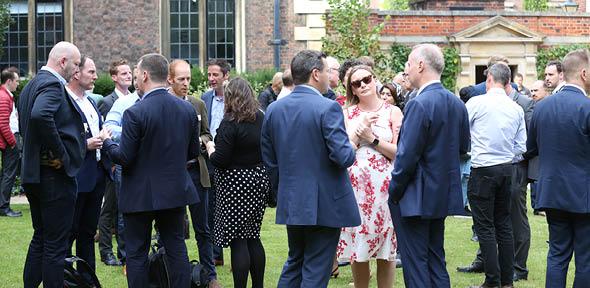
Submitted by Debra Royal on Mon, 16/09/2019 - 13:53
On 11 September, bathed in afternoon sunshine and amid the vibrant colours of St Catharine’s College’s gardens, CDBB and the Construction Innovation Hub hosted a reception for industry insiders, researchers and policymakers – all with an interest in making Building Information Modelling (BIM) ‘business as usual’.
More than 60 attendees joined us to network, meet old friends, make new connections and to demonstrate their support for BIM and its critical importance to the construction industry. Many of those present had taken part in a series of roundtables run over the last twelve months by CDBB and the Chartered Institute of Building in partnership with Construction Manager. The aim of the roundtables was to bring together key interest groups from across the industry to discuss the benefits of BIM and the barriers that are preventing its more widespread adoption.
Keith Waller, Programme Director of the Construction Innovation Hub (a collaboration between the Manufacturing Technology Centre, Building Research Establishment and CDBB) spoke about the Hub’s commitment to delivering the ambitions set out in the government’s construction sector deal.
Keith said: “In the UK, we spend around £65 billion every year on economic and social infrastructure projects, building things like new schools and hospitals, roads and railways. The question for all of us is how can we do this in a way which delivers benefits for everyone while helping to decarbonise our economy and making our industry better, more attractive and more inclusive.”
Stressing BIM’s pivotal role in moving us towards a digital built Britain and commending the work of CDBB and the UK BIM Alliance in promoting it, Waller introduced CDBB’s Terry Stocks.
Stocks thanked all those who had given up their time to take part in the roundtables. “They were hugely powerful,” Stocks explained, “because we were able to get groups representing different sectors and services in the same room and ask them the same question: what do you need to make BIM business as usual? This meant we were able to build up a consistent picture of the issues facing the sector and focus on finding solutions.”
The eight roundtables ran from September 2018 to July 2019 and spanned academia and training, constructors, consultants, manufacturers, SMEs, technology companies and specialist BIM consultants. Stocks and his co-chair, Fiona Moore, are analysing the outputs from the roundtables, identifying the common themes and developing a set of next steps that will help BIM become ‘business as usual’.
The final report will be available soon. In the meantime, you can read about all eight of the roundtables at www.cdbb.cam.ac.uk/BIM/UKBIM/CDBB_CIOBRoundtables
